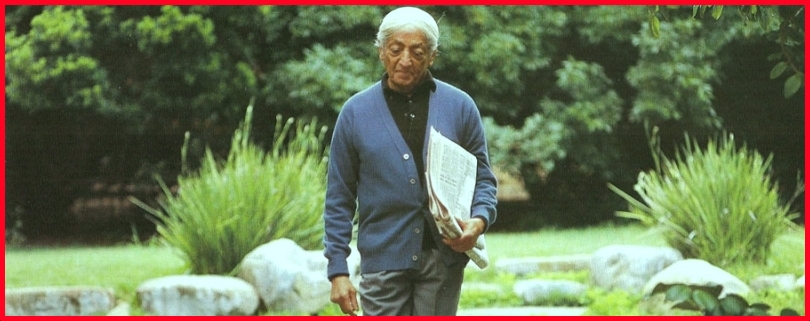J. Krishnamurti was one of the greatest educational philosophers of our times and his deep love and sensitivity towards children and the evolution of the human mind make his educational ideas and vision truly inspirational and relevant even in the contemporary times. Krishnamurti believed that the true purpose of education was not to produce mechanised, robotic, blindly conforming individuals but individuals with deep sensitivity, holistic awareness of all that is inside and outside and an ability to respond to situations while retaining their intelligence and creativity. In other words, J. Krishnamurti’s educational ideas are premised on the goal of inner blooming rather than a mechanical process of knowledge acquisition.
He would visualise an education that would give shape to people who would be spontaneous, sensitive, creative rather than mechanical, unimaginative and inclined to go by the herd mentality.
For him, education in the truest sense of the term would allow the learner to break free from and challenge pre-conceived structures, the need to compulsively fit into roles and expectations dictated by the society, follow things blindly and be mechanical, non-creative, ritualistic and fearful of change.
Education ought to be a liberating rather than a confining process, an effort towards giving birth to a new and awakened self that is limitless, free of all boundaries and self-imposed limitations, sensitivity and full of love, intelligence and a holistic attitude to all that is going on at the external as well as the internal levels.
An education of this kind would make the individual harmonious with one’s surroundings and erase all dualities, fragmentations and dilemmas. The idea that he most strongly voiced was that a true education ought to be against all forms of regimentation and ritualism that give birth to very robotic and machine like individuals who go on adhering to social expectations and norms without developing a thinking and creativity of their own, giving birth to prejudices, pre-preconceived notions and a brand of knowledge that acts in a limiting rather than a liberating manner.
Another thing which was very crucial to his scheme of ideas was that unlike mainstream perceptions, he doesn’t visualise the teacher as a storehouse of knowledge and students empty vessels waiting to be filled. His idea of education gives critical importance to dialogue and listening as vital faculties that make the teaching-learning process a mutual journey towards nurturance and growth rather than a one-sided, deeply hierarchical and non-reflexive passage of information from a so-called superior teacher to the inferior learner.
He advocated for the teacher’s role to be that of a catalyst, as a co-traveller who is walking alongside the learner in a journey of mutual discovery and exploration or a co-participant in the journey to total blossoming of the mind and the heart.
The teacher has been visualised as a life-long learner and explores herself with deep understanding of children, a sensitivity towards their world and a deeply entrenched respect for the emancipatory educational process as a chance to participate in the full blooming of the potential that lies stored in every child.
Perhaps that is why the child’s own creativity, intelligence and discretion are so important in J. Krishnamurti’s scheme of ideas, he continuously emphasised that the whole goal of education is to light up the potential and hidden possibilities within the child, build a bride between intelligence and creativity, between the rational and the emotional, the mind and the heart so that both these aspects of the being can function in harmony, in sync and bring an end to fragmentation and dualism that seem to make the larger world a very conflicted and unhappy place to live in.
All throughout his life, J. Krishnamurti kept on talking about the need for a child-centric, pedagogically enriched and spiritually empowered education that cultivated the child’s mind to go beyond boundaries, look beyond artificial differences and dualisms and from a fragmented, divided and fractured being get transformed into a harmonious, non-divided and complete whole.
Education was then visualised not as a matter of accumulating degrees or boasting of qualifications attained from prestigious institutions, but the flowering of the child’s self wherein all aspects of his/her being are nurtured and nourished and there is a focus on holistic growth rather than fractured development.
Who can forget Krishnamurthy’s famous lines, “Truth is a pathless land”, wherein he reminds us that no institutionalised religion, faith, doctrine or guru can educate us or take us from darkness to light, from falsehood to truth- we have to chart out our own unique and distinctive trajectories to break free and experience the freedom of the borderless skies.
J. Krishnamurti’s radical and immensely progressive approach to education helps us to more sharply understand where we are going wrong today in our ways of looking at education. Today education has been reduced into a means of attaining a better job, a better salary package or a way to leave behind our peers in a perpetual rat-race that satisfies our own egos.
But for Krishnamurti, education’s purpose was to bring about love and freedom into the world as opposed to fear and competition.
Education as he often would articulate should be an attempt to help towards the “flowering of the goodness” inherent in each individual and that it should be a key step towards the healing, transformation of the society as a collective whole. Today we see educated scientists building weapons of mass destruction, highly qualified doctors and medical practitioners developing ways of killing female foetuses, engineers designing buildings with poor standard materials that collapse and end up killing hundreds of innocent people in a matter of seconds, political leaders and spiritual messiahs often misdirect people in the name of faith- all this must compel us to rethink the kind of education that we have so long prioritised and think whether such a mistake can be afforded in an already broke, conflicted and wounded world?
We can realise the truth in J. Krishnamurti thoughts by simply looking at the violent and conflict ridden world where despite the fact that more and more people are going to universities and attaining degrees at prestigious institutions, people still continue to be violent, destructive and unhappy.
There is certainly something fundamentally wrong with the kind of education that is imparted in what we know as educational institutions and its discontents are what is being reflected in our society.
But for J. Krishnamurti the role of education is to give birth to integrated and thereby intelligent human beings and for him, intelligence was never bookish knowledge but a process that nurtured the mind and the heart so that people can be encouraged to free themselves from conflict and dualism through the birth of a true awareness.
What set him apart was that he didn’t look at education merely as the acquisition of bookish information but the simultaneous development of the mind and the heart and a process for developing the inner goodness inherent in each person and working for the transformation of the society as a whole. Krishnamurti’s educational vision was truly an eye-opener, a deeply radical and progressive way of conceiving the individual in the light of knowledge. His visions, his aspirations and his ideas continue to inspire us and remind us of the urgent need to rethink education in our times.










